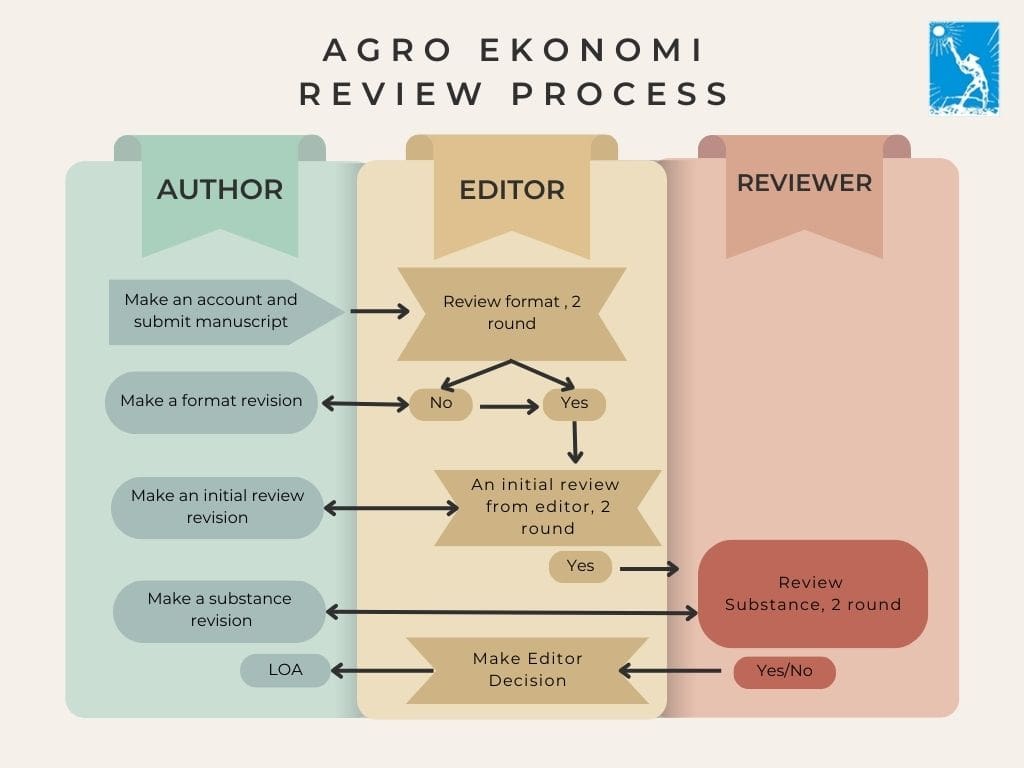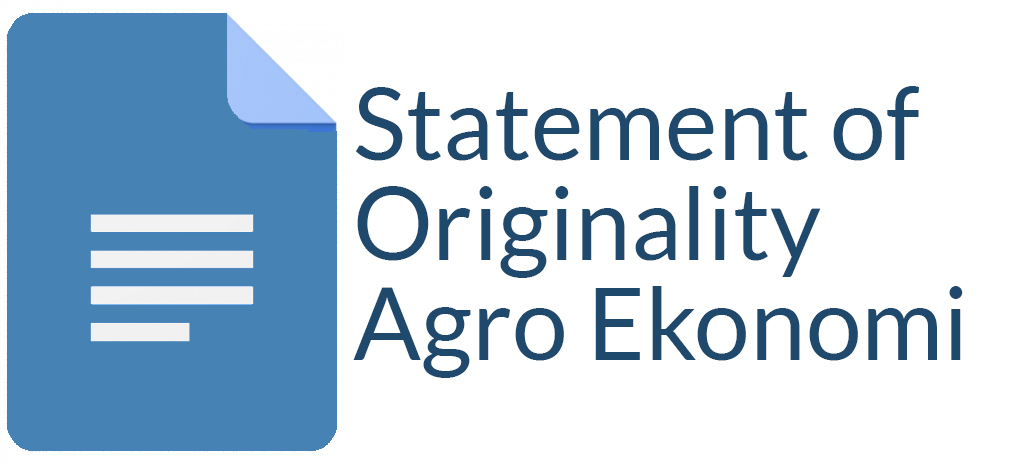The Effect of Good Agriculture Practices (GAP) on Soybean Productivity with Cobb-Douglas Production Function Analysis in Kulon Progo Regency
Fitry Purnamasari(1*), Lestari Rahayu Waluyati(2), Masyhuri Masyhuri(3)
(1) Faculty of Agriculture, Universitas Gadjah Mada
(2) Faculty of Agriculture, Universitas Gadjah Mada
(3) Faculty of Agriculture, Universitas Gadjah Mada
(*) Corresponding Author
Abstract
This study aims to determine the level of adoption of Good Agriculture Practices (GAP) and the influence of GAP and other factors of production on soybean productivity. The number of respondents in this research is 50 farmers taken randomly. This research used proportional parameter test and multiple linear regression analysis with Ordinary Least Square (OLS) method. This research has been declared valid, reliability, data have been the normal distribution, free from multicollinearity and heteroscedasticity problem. The result of the analysis shows that (1) the adoption rate of GAP of soybean farmers in Kulon Progo Regency is categorized as a high category. Farmers adopted 83,07% of the overall GAP portion of the input, land preparation, planting, fertilizing, crop protection, irrigation, harvesting, and post-harvest. (2) The result of the R2 test shows that 47,8% variation of soybean productivity can be explained by the eight independent variables and the remainder is explained by variables outside the model. F test results show that the independent variables together affect the productivity of soybeans. The result of t-test shows that Seed, manure, Gandasil fertilizer, GAP adoption rate significantly positive and NPK fertilizer significantly negatively affect soybean productivity.
Keywords
Full Text:
PDFReferences
REFERENCES
Bayramoglu Z, Gundogmus E, Tatlidil FF. 2010. The Impact of EurepGAP Requirement on Farm Income from Greenhouse Tomatoes in Turkey. African Journal of Agricultural Research Vol. 5 (5), pp. 348-355, 4 March, 2010.
[BPS] Badan Pusat Statistik. 2016. Luas Panen dan Produksi Kedelai Menurut Provinsi (ton), 1993-2015. https://www.bps.go.id/ [Diakses 15 Januari 2017].
Ghozali, I. 2012. Aplikasi Analisis Multivariante Dengan Program SPSS. Semarang: Badan Penerbit Universitas Diponegoro.
Isnowati, S. 2014. Faktor yang mempengaruhi produksi kedelai di Desa Kebonagung, Kecamatan Tegowanu, Kabupaten Grobogan. SEPA, 10(2): 177-185.
Mahabirama, A.K., Kuswanti, H., Daryanto, S., dan Winandi, R. 2013. Analisis Efisiensi dan Pendapatan Usahatani Kedelai di Kabupaten Garut Provinsi Jawa Barat. Jurnal Aplikasi Manajemen XI(2): 197-206.
Nugroho, N, Bahrun, A. 2014. Pengaruh Sitem Tanam dan Waktu Aplikasi Pupuk Lewat Daun terhadap HAsil Tanaman Kedelai (Glycine max (L.) Merr.) Varietas Anjasmoro Tanpa Olah Tanah. Jurnal Agro UPY Vol. VI. No. 1 September 2014.
Rahayu, W. dan Riptanti, E.W. 2010. Analisis Efisiensi Ekonomi Penggunaan Faktor-Faktor Produksi Pada Usahatani Kedelai Di Kabupaten Sukoharjo. Caraka Tani XXV No. 1 Maret 2010.
Setiawan F, dkk. 2015. Implementasi GAP (Good Agriculture Practice) lada dan pengaruhnya terhadap produktivitas lada di Desa Petaling Banjar, Kecamatan Mendo Barat. Enviagro, Jurnal Pertanian dan Lingkungan. Vol.8 No. 2, hal 72-82. ISSN 1978-1644.
Sukma, T., Hartono, S., Djuwari. 2013. Pattern Analysis of Tobacco Farming Partnerships and Self in the Lamuk Village Tlogomulyo Sub District Temanggung. Agro Ekonomi Vol. 24/ No. 1, Juni 2013.
Sumarno & Adie, M.M. 2010. Strategi Pengembangan Produksi Menuju Swasembada Kedelai Berkelanjutan. Jurnal Iptek Tanaman Pangan Vol. 5 No. 1 – 2010.
Tahir, AG 2011. Analisis risiko produksi usahatani kedelai pada berbagai tipe lahan di sulawesi selatan. Jurnal Sosial Ekonomi Pertanian VIII(1): 1-15.
Zakaria, Amar. K. 2010. Kebijakan Pengembangan Budidaya Kedelai Menuju Swasembada melalui Partisipasi Petani. Analisis Kebijakan Pertanian: Volume 8 No. 3. September 2010, P. 259-272. Bogor: Pusat Analisis Sosial Ekonomi dan Kebijakan Pertanian.
Article Metrics
Refbacks
- There are currently no refbacks.
Copyright (c) 2018 Agro Ekonomi

This work is licensed under a Creative Commons Attribution-ShareAlike 4.0 International License.
View My Stats











